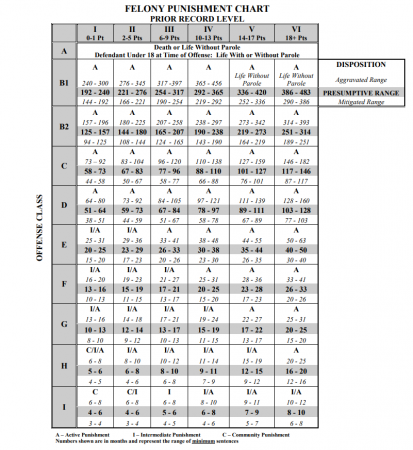Felonies in North Carolina are separated into ten classes (A, B1, B2, C, D, E, F, G, H, and I) based on the severity of the crime. Class A felonies are considered the most serious and Class I the least serious. North Carolina also has strict guidelines the Judge is to follow when determining the punishment for a felony conviction. Below is the Felony Punishment Chart that lays out the possible structured outcomes.

TYPES OF PUNISHMENT
Active Punishment: Time spent in jail/prison for the duration of the punishment period
Intermediate Punishment: Require supervised probation with one or more of the following:
• Split Sentence (both active time in jail and supervised probation)
• House Arrest with Electronic Monitoring
• Intensive Daily Supervision
• Overnight Stays in Residential Centers
• Day Reporting Center
• Drug Treatment Court
Community Punishment: Unsupervised probation that could include fines, restitution, community service, etc.
PRIOR RECORD LEVEL
A defendant’s prior record level is determined by the amount of past criminal convictions. The more points a defendant has, the more severe his/her punishment will be. The calculations for this are as follows:
• Each Prior Class A Felony Conviction = 10 pts
• Each Prior Class B1 Felony Conviction = 9 pts
• Each Prior Class B2, C, or D Felony Conviction = 6pts
• Each Prior Class E, F, or G Felony Conviction = 4 pts
• Each Prior Class H or I Felony Conviction = 2 pts
• Each Prior Misdemeanor Conviction = 1 pt
DISPOSITION RANGES
In the above chart, you will also see the bolded numbers listed as the “PRESUMPTIVE RANGE”. This is the standard sentence for any given felony. Unless the court finds aggravating or mitigating circumstances, your punishment will fall in between this range. Aggravating circumstances are reasons the crime could be considered more serious. This could include the victim being very young or old, the crime is especially heinous or cruel, etc. Mitigating circumstances are the exact opposite. Situations that could help lessen the perceived severity of the crime could include the defendant’s age, history of abuse, etc.
FIND A LAWYER
You may have made a felonious mistake, but that does not mean you are on your own. You need an attorney who will help point out any present mitigating factors to the court to help lessen the severity of your punishment. Our firm understands the evidence that will be provided by the prosecution and is determined to represent and protect you.

